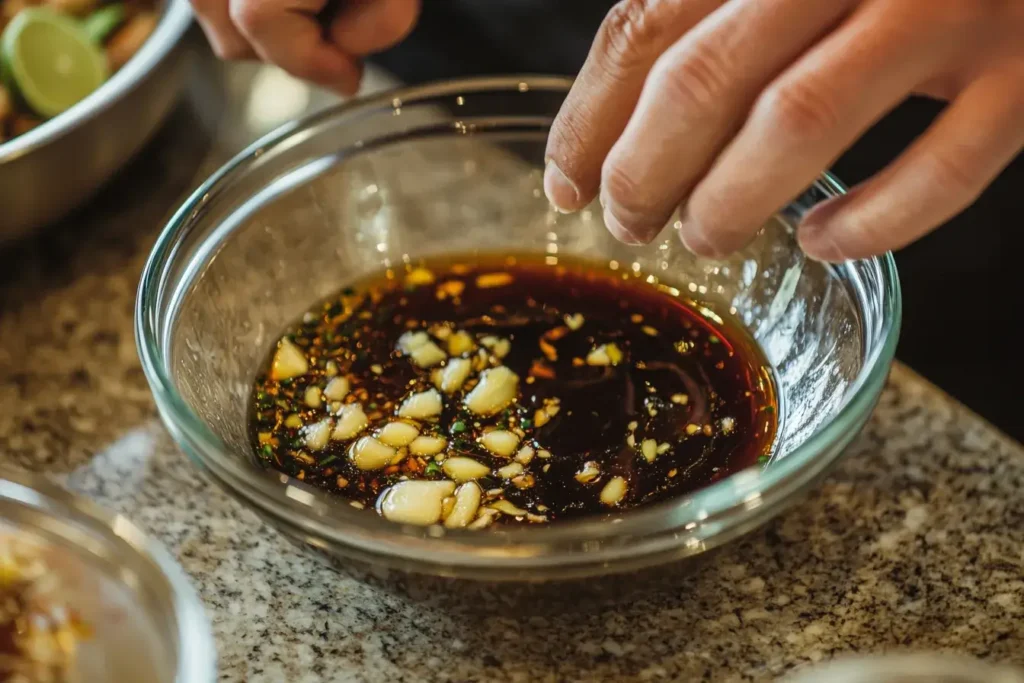Soy sauce isn’t just a kitchen favorite; it’s a cooking essential that changes meals with its rich, savory taste. Can you use soy sauce as a marinade? Absolutely! Its ability to boost flavor in a wide range of dishes makes it an invaluable ingredient. Whether you’re making a quick stir-fry, a hearty stew, or a simple dipping sauce, soy sauce can transform the flavor profile with minimal effort.
From softening meats to adding a depth of flavor, soy sauce also works as an amazing marinade. Its natural saltiness enhances the texture of meats while breaking down proteins, making them tender and juicy. This makes it especially effective for chicken, beef, and seafood dishes. When paired with complementary ingredients like garlic, honey, or citrus, soy sauce becomes the perfect base for marinades that balance salty, sweet, and tangy flavors.
Soy sauce is not only versatile but also incredibly easy to use. Whether you’re a beginner learning basic recipes or an experienced cook experimenting with fusion dishes, it adapts to your needs. Its adaptability and ability to mix seamlessly with a variety of flavors make it a must-have in any kitchen. In this article, we’ll explore its benefits, the best ways to use it, and how you can incorporate it into your cooking to elevate your meals.
Soy Sauce as a Kitchen Staple
What Makes Soy Sauce a Good Marinade?
Soy sauce is an amazing marinade base because it combines flavor and purpose. Its high salt level helps soften proteins, making meats like chicken, beef, and pork tender and juicy. This isn’t just about taste; it’s also about texture.
Soy sauce is also full of a savory flavor that makes dishes richer and more satisfying. When mixed with ingredients like garlic or ginger, it improves the taste of almost any food. Whether you’re using it for meat, seafood, or vegetables, soy sauce creates a strong, tasty base for your meals.
Key Ingredients in Soy Sauce That Make It Ideal for Marinades
The magic of soy sauce lies in its complex fermentation process, which combines soybeans, wheat, salt, and water. Each ingredient plays a critical role:
- Soybeans: The primary source of umami flavor.
- Salt: Enhances taste and acts as a natural preservative.
- Wheat: Contributes to the sauce’s slight sweetness and aroma.
These components don’t just provide flavor—they balance and enhance other ingredients in your marinade, making soy sauce a versatile choice for countless recipes.
Key Takeaways for Part 1
- Soy sauce is not only flavorful but also functional, with tenderizing properties.
- Its umami-rich profile complements various proteins and vegetables.
- The fermentation process ensures a complex, balanced taste perfect for marinades.
Benefits of Using Soy Sauce as a Marinade
Why Choose Soy Sauce Over Other Marinade Bases?
Soy sauce stands out from other marinades because of its great flexibility. Its strong flavor works well with almost any protein, like chicken and seafood, and it’s also excellent for vegetables. Unlike thick, creamy marinades, soy sauce is light but tasty, letting the real flavor of your ingredients come through.
Another big plus is how easy it is to use. Whether you’re making a quick dinner or trying new recipes, soy sauce is a pantry favorite that makes cooking simpler without losing flavor. Its rich, savory taste mixes easily with ingredients like citrus, honey, and garlic, making it fit for many types of cooking.
Nutritional Benefits of Soy Sauce Marinades
For those focused on health, soy sauce is a low-calorie option compared to creamy or oily marinades. It’s great for adding flavor without extra fat or sugar. Soy sauce also has antioxidants that can reduce harmful effects from cooking.
It provides small amounts of helpful minerals like manganese and magnesium, adding some health benefits along with flavor. If you’re limiting salt, using low-sodium soy sauce is a smart choice to get the good qualities of soy sauce without the downsides of too much salt.
How to Marinate with Soy Sauce Effectively
Steps for Creating the Perfect Soy Sauce Marinade
Making a balanced soy sauce marinade is all about the right mix of flavors. Start with soy sauce as the base, then add complementary ingredients like:
- Ginger and garlic: For an aromatic punch
- Honey or brown sugar: To balance the saltiness with sweetness
- Citrus juice: For a tangy twist
Mix these ingredients well, and adjust ratios to suit your taste. A general rule of thumb is to maintain a 2:1 ratio of soy sauce to other liquids (like water or citrus juice). Let your protein or vegetables soak for the recommended time to ensure even absorption.
Tips for Marinating Different Proteins with Soy Sauce
- Chicken: Let chicken sit in the marinade for 30 minutes to 2 hours to absorb the umami-rich flavors without overpowering the natural taste.
- Beef: Marinate for at least 4 hours, or overnight for tougher cuts, to ensure tenderization and flavor penetration.
- Seafood: Keep it brief—15 to 30 minutes is enough, as longer durations can break down the delicate texture of fish or shrimp.

To avoid a salty aftertaste, always balance soy sauce with acidic or sweet ingredients. This ensures your dish has depth without being overwhelming.
Common Mistakes When Using Soy Sauce as a Marinade
Over-salting Issues and How to Avoid Them
One of the most common problems with using soy sauce as a marinade is making it too salty. Soy sauce naturally has a lot of salt, and when mixed with other salty ingredients, it can become too strong. To avoid this, try using a low-salt soy sauce or thinning regular soy sauce with water or broth. Adding sweeteners like honey or brown sugar can also help balance the taste.
It’s also important to watch how long you marinate your food. Leaving food in soy sauce for too long can make it too salty and change its texture in a bad way. For example, chicken or seafood should not stay in a soy-based marinade for more than a few hours.
Marinating Time Guidelines to Prevent Overpowering
The amount of time you leave your ingredients in a soy sauce marinade directly affects the taste. Follow these general guidelines to avoid over-marinating:
- Chicken: No more than 2 hours for optimal flavor without overpowering.
- Beef: 4-12 hours works best, especially for tougher cuts.
- Seafood: Limit to 15-30 minutes to preserve texture while enhancing taste.
It’s always better to under-marinade than overdo it, as you can always add flavor while cooking.
For more marinade tips and recipes, check out our detailed guide to Asian Chicken Marinade.
Recipe Examples for Soy Sauce Marinades
Classic Soy Sauce and Ginger Marinade
This simple recipe showcases how soy sauce can create a flavorful foundation.
Ingredients:
- 1/3 cup soy sauce
- 1 tablespoon grated ginger
- 1 minced garlic clove
- 1 tablespoon honey
Instructions:
- Combine all ingredients in a bowl.
- Marinate your protein of choice for the recommended time.
This versatile marinade works beautifully with chicken or tofu.
Sweet and Spicy Soy Sauce Marinade for Chicken
Ingredients:
- 1/3 cup soy sauce
- 2 tablespoons honey
- 1 teaspoon chili flakes
- 1 tablespoon lime juice
Instructions:
- Mix all ingredients in a bowl until combined.
- Coat chicken thoroughly and let sit for up to 2 hours.
This marinade adds a zesty kick to grilled or baked chicken.

Soy Sauce and Citrus Marinade for Seafood
For seafood lovers, this recipe blends the salty richness of soy sauce with the brightness of citrus.
Ingredients:
- 1/4 cup soy sauce
- Juice of 1 lemon
- Zest of 1 orange
- 1 tablespoon olive oil
Instructions:
- Whisk all ingredients together.
- Let seafood soak for no more than 30 minutes.
This marinade is a fantastic choice for salmon or shrimp, enhancing their natural sweetness.
Explore more exciting recipes like this in our Chicken Fajita Marinade Guide.
Exploring Alternatives
When to Opt for Soy Sauce Substitutes
If you’re out of soy sauce or want to try something different, there are several substitutes that deliver similar results. Options like tamari or coconut aminos are great for those looking for gluten-free or lower-sodium alternatives. Worcestershire sauce, with its tangy and slightly sweet profile, can also step in for soy sauce in many marinades.
For a completely unique twist, try hoisin sauce. Its rich, sweet, and salty flavor can add depth to recipes where soy sauce is typically used.
Finding the Right Flavor Profile
- Tamari: A gluten-free option with a similar umami punch, perfect for those with dietary restrictions.
- Coconut Aminos: Slightly sweeter and less salty than soy sauce, it’s an excellent low-sodium choice.
- Worcestershire Sauce: Tangy and flavorful, ideal for adding complexity to beef marinades.
Experimenting with these alternatives can lead to surprising results while maintaining the balance and depth of your dishes. If you’re curious about how they might work in your next recipe, visit Asian Chicken Marinade Recipes Guide.
Long-Term Benefits of Using Soy Sauce Marinades
Why Mastering Marinades Matters
Using soy sauce marinades regularly can transform the way you cook. In addition, not only does it simplify meal prep by acting as a one-stop solution for flavoring, but it also improves the texture and taste of your dishes. Therefore, by learning how to balance soy sauce with complementary ingredients, you’ll find yourself creating restaurant-quality meals at home more often.
Building Confidence in the Kitchen
Mastering soy sauce marinades equips you with a valuable culinary skill—one that’s versatile, simple, and effective. Moreover, understanding the balance of salt, sweetness, and acidity helps you create dishes that are consistently well-flavored. On the other hand, the ability to adapt a basic soy sauce marinade to different cuisines ensures you’ll never run out of ideas in the kitchen.
Thus, remember, the answer to Can you use soy sauce as a marinade? is not only yes—it’s also a resounding endorsement of its versatility and impact on your cooking journey. Whether you’re a beginner or a seasoned chef, soy sauce can be your secret weapon.
For more advanced techniques, explore this guide to Asian Chicken Marinade Recipes.
FAQs and Practical Insights
Can Soy Sauce Tenderize Meat?
Yes, soy sauce is excellent at tenderizing meat! Its high sodium content helps break down proteins, making tough cuts softer and more flavorful. Additionally, the amino acids in soy sauce work with natural sugars to create a tenderizing effect. However, for best results, balance the soy sauce with acidic components like citrus juice or vinegar to amplify this effect.
Is Soy Sauce Marinade Suitable for Vegetables?
Absolutely! Soy sauce isn’t just for meat—it also adds a savory punch to vegetables. Combine soy sauce with sesame oil, garlic, and a splash of vinegar to create a perfect marinade for grilled or roasted veggies. Marinate for 15–30 minutes to avoid overpowering their natural flavors.
What is the Shelf Life of Soy Sauce Marinade?
Homemade soy sauce marinades can typically last up to 3–5 days when stored in the refrigerator in an airtight container. Avoid reusing marinades that have been in contact with raw meat, as they may contain harmful bacteria. If you’re looking for a longer shelf life, consider making a concentrated marinade and diluting it when ready to use.
Conclusion: Unlocking the Potential of Soy Sauce Marinades
Why Soy Sauce is a Must-Have in Your Kitchen Arsenal
So, can you use soy sauce as a marinade? Definitely, and it’s more useful than you might think. From softening tough meats to improving the natural taste of vegetables, soy sauce is an ingredient that every kitchen needs. Its rich, savory flavor works as a great base for many recipes, letting you combine it with other ingredients to fit any type of cooking.
Also, soy sauce is easy to use and widely available, making it a smart choice for both quick weeknight meals and special weekend dishes. Whether you’re marinating chicken for a barbecue or seafood for a light, healthy option, soy sauce adds amazing flavor without extra calories.
Experimenting with Soy Sauce-Based Marinades
Don’t hesitate to get creative with soy sauce in your marinades. Pair it with ingredients like honey for sweetness, chili flakes for heat, or citrus for a refreshing twist. Experimenting with flavors can lead to delicious discoveries and elevate your cooking to new heights.
For even more inspiration, check out this Chicken Fajita Marinade Guide, packed with creative ideas and tips.

